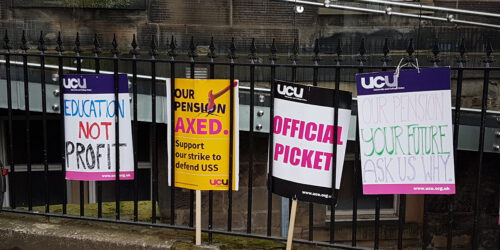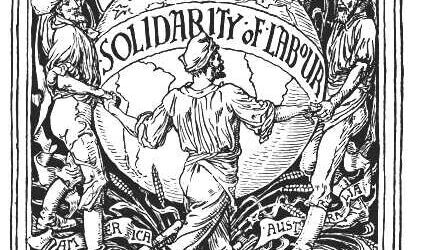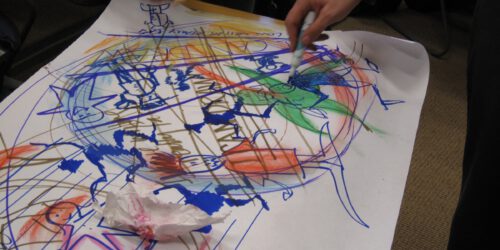The Ways We Work: Part 2, Extractivism in the University

This post by Rachel Webb Jekanowski, Anne Pasek, and Kate Elliott (with additional insights and contributions from Kaitlin Blanchard) is the second of a three-part series on the relationship between climate change and university working cultures.
In the first post of our series, we outlined several ways that fossil energy can be found in the academy, ranging from financial investments to research methods and air travel. Universities are systems that hide the energies on which they depend.
As environmental and energy historians, we have a great deal of insight into the development of energy regimes and cultures. Yet often this thinking focuses on fossil fuels simply as an energy input (albeit one that might have subsequent effects on cultural production, politics, and social formations). However, addressing the climate crisis requires a broader realignment of contemporary energy systems: both energy consumption (e.g., oil) and our own energy outputs. In other words, we have to talk about labour.
Labour as an Energy Politics
As Cara New Daggett observes in The Birth of Energy: Fossil Fuels, Thermodynamics, and the Politics of Work, energy is used to describe all sorts of things: the work of human and nonhuman animals, fossil fuels and renewables like wind and solar, literary metaphors, human vigour, and principles in physics (Daggett 2019, 1). Energy, in the grandest sense, is the “production and reproduction” of life (ibid), powering human societies, industries, and cultures. However, in contemporary debates about the climate crisis and transitions to a post-oil world, these other aspects of energy often get dropped. To echo Daggett: “Why does energy politics refer to the acquisition and security of fuel, rather than to the politics of ensuring public vitality?” (3).
The idea that an energy politics could encompass the reproduction of public vitality is particularly germane to the university. As a sector, it is tasked with the education and class mobility of large segments of society; as such, in countries like Canada, universities are also largely funded by public dollars. These institutions have become powerful economic players as employers and land-owners, within local communities, industry sectors, and internationally. For instance, Columbia University and New York University—both private American research universities—comprise two of the top ten property owners in New York City. On the west coast of Canada, the University of British Columbia (a publicly-funded institution) generate over a billion Canadian dollars for its academic endowment from housing sales and rentals of its property holdings. Memorial University (a public institution) is the sole university in the Canadian province of Newfoundland and Labrador and a major economic driver in the province through its operational expenses, student and staff expenditures, and jobs creation.
As these examples highlight, universities (even private ones) maintain a great deal of public sway, economic clout, and cultural power. They also reveal the need for a more expansive and intersectional understanding of energy politics. The aforementioned institutions, like most in the United States and Canada, were able to build their wealth and social capital on lands taken from Indigenous nations, Others were further built with enslaved and migrant labour, as journalists and researchers have painstakingly documented in recent years. While some institutions like Brown University (a private U.S. institution in Rhode Island) have materially supported efforts to document its historical participation in the trans-Atlantic slave trade and anti-Black racism, many others have preferred to let these histories lie undisturbed and avoid calls for reparations.
At the same time, precarious labour conditions define the contemporary university in many ways, as does neoliberal capitalism. In response to state defunding, industry pressures, and the increasing role of public-private partnerships in academia, a financial crisis has developed within the core operations of the institution. As such, universities in most of the Western world have shifted to a model dependent on poorly-paid adjuncts, graduate instructors, and lecturers on short-term contracts with little to no job security. Tenure-track and other secure teaching and research positions are no longer the norm. Adjuncts and precariously-employed instructors now constitute between half to two-thirds of the academic workforce in North America and Britain and up to 80% of those in Germany. Nearly everyone on the academic job market, in graduate school, or serving on hiring committees have experienced this hollowing out of the tenure ranks in one way or another, and the consequential destabilising of academics’ labour conditions. Numerous studies have shown how the weakening of educators’ institutional power contributes to the erosion of unions’ bargaining power, a hollowing out of adjuncts’ research time (crucial for job security and promotion), the quality of undergraduate education, and the mental and emotional heath of workers and students alike. This labour crisis in higher ed certainly predates the COVID-19 pandemic, but the global economic insecurities also helped reveal and exacerbate the crisis. Our personal and professional energies are increasingly divided and diminished by a system that requires more and more labour for less.
Extractivism in the Contemporary University
These structural conditions have a name: extractivism. Recently, the concept has become common within humanities scholarship about unfettered resource extraction under capitalism—that is to say, the removal and transportation of substances from their environments (often in colonial peripheries) and transported across vast distances for use as “raw materials” elsewhere (Tsing 2005). The term “extractivism” emerges from Latin American theories of political economy and resistance to racial capitalism (Gomez-Barris 2017). As Imre Szeman and Jennifer Wenzel explain, the meaning of extractivism has since expanded beyond questions of resource industries in that it names “an ideology and cultural logic that permeates social imaginaries” and cultural productions.
Leanne Betasamosake Simpson defines extractivism even more simply: “extraction is stealing—it is taking without consent, without thought, care or even knowledge of the impacts on the other living things in that environment.” It is an integral part of “colonialism and conquest” and, today, a primary cause of the current climate crisis. Simpson notes that the environmental consequences of colonialism are not new, as “Indigenous peoples have lived through environmental collapse on local and regional levels since the beginning of colonialism.”
While extractivism has been taken up by scholars and activists in many contexts, we use this term to describe a collection of material practices and a mindset—an ideology—that legitimises the exploitative production of economic, social, political, and emotional value from human and nonhuman worlds. In other words, it’s a way of relating to environments, ideas, and people with material consequences for communities in the wake of extractivist projects and interactions.
Within the context of the university, extractivism doesn’t only bloody our histories and exploit its workers; it also produces students as resources in themselves. Within austerity-defined and neoliberal universities, students are positioned as “consumers”—or even dehumanised into “basic income units,” in the case of the University of Toronto—turning their education and university extracurriculars into products (or “deliverables”) to be bought and sold.
Yet students are also producers of debt; they are speculative resources based on their ability to borrow money to finance the ever-escalating costs of a degree. Anne Helen Petersen offers a scathing analysis of this extractivist logic of “student-as-debt-producer” and “degree-as-revenue-source” in her writing on late-capitalist burn-out and the accumulation of debt from Master’s degree programs at American universities.[1] These tendencies are all especially acute for Black and brown students in the United States, who carry a disproportionate share of student debt, and international students, who are primarily framed in university strategy as a revenue source.
Extractivism also complicates and diminishes our connections to place. Consider the local: for many of us, this is a fractured concept. One consequence of extractivism within the academy is the ways in which it inhibits (if not forecloses) sustained relationship-building with the very communities and environments in which scholars and students live. Within the current job market, graduate students and academics are presumed to have limitless mobility, uprooting themselves from their communities, families, or networks to relocate for a new job or educational opportunity. Capitalist-colonial expectations of academic mobility reflect extractivist logic of resource colonialism, transforming workers into resources that move across far-flung geographies. This is inimical to long-term, place-based and community-engaged work—which is of course fundamental to many working within the environmental sciences, environmental humanities, Indigenous science studies, and anti-colonial methodologies.
Extractivism also conditions the demographics of the university, and the conditions under which diversity is supported or managed. This surfaces in who has access to graduate funding, full-time enrolment in academic programs, stable academic employment, and who is seen as experts of their own experience (rather than subjects of study by others). The cultures and knowledges of Indigenous and Black scholars, in particular, are often positioned as “resources” for the academy to exploit, even as the scholars themselves experience all manner of systemic racism. The structures in which we work also force many disabled people and care-takers out of the academy due to physically inaccessible workplaces, lack of access to necessary healthcare and supports, and time and epistemological barriers.[2] Insights from disabled communities, as Sarah Ahmed reminds in Complaint! (2021), are often taken as personal complaints rather than structural critiques. Institutional responses frequently serve to contain the embodied experiences of disbled students and workers under the banner of “reform,” obscuring knowledge that could lead to systemic change (Blanchard).[3] Doing otherwise would require a reconsideration of the logics of efficiency and value that guide the culture and expectations of universities as intensely as they narrow its definitions of public service.
An analysis that centres the scale of climates and atmospheric CO2 will not necessarily address these problems of extraction. In fact, we might readily imagine forms of climate action in the university that are all too compatible with green austerity measures. When travel budgets get cut, whose will get cut first and furthest? If flights are to be rationed, will they be allocated to international student recruitment or research on and with distant communities? If climate action is framed in such a subtractive way, will it make more enemies than allies in the labour force?
Towards a Sustaining University
One key argument in this post is that grappling with the energy politics of the modern university—and the ways that academia is implicated in the climate crisis—requires us to think beyond fossil fuels. Oil’s entanglements with university finances and research methods is certainly one problem that scholars must address. But decarbonizing academia without radically reformulating its exploitative labour politics and colonial substructure will leave the sector’s extractivist core intact.[4] We can’t afford to repeat this pattern across the many domains in which extractivism operates in the university today. We want more than just a green campus; we want a university that sustains instead of one that steals.
What we need is systems change. It’s not enough to focus on carbon, we have to focus on the systems to which the carbon is articulated. To understand the university as an extractivist institution is to think about who it serves and who it takes from—to identify the things that it builds and the things that it erodes in the hidden elsewheres. And so, to imagine alternatives to extraction is also to imagine worlds and worldmaking projects that are expansive, equitable, and exciting.
Solutions can be found in projects of access, care, and reciprocity across many overlapping fronts. This is at first a question of labour: we need time, security, community, and robust unions to do the reparative work these histories of extractivism so urgently demand. But it is also one of finance: student loan forgiveness, anti-austerity measures, and fossil fuel divestment are all calls to build a different economic base for the university. Accessibility—for disabled scholars, time-constrained care workers, for everyone!—doesn’t only facilitate greater participation in knowledge creation and exchange, it changes the structure of work and education itself (Blanchard). Accessibility, as a radical practice and open processual striving (Tanya Titchkosky), resists assimilation into the work of the university (Blanchard). Reparations to the descendants of the enslaved and displaced peoples at the heart of our institutional histories, as well as initiatives to directly give back Indigenous lands, are further fronts through which universities can symbolically and materially address their colonial foundations. In so doing, we will open further possibilities for custodial and more-than-human ways of relating to the world.
The scale and multifaceted nature of these problems may seem daunting—we worry that we have overwhelmed you in our efforts to list them. But in this list of harms we see strengths and opportunities in equal measure. Extractivism has spurred the creation of many hundreds of social movements: for BIPOC solidarity, migrant worker justice, curricular reform, disability justice, and more.[5] These movements are alive within our institutions, even if they are sometimes quiet and disconnected. But all these social movements demand a reckoning with the foundational norms, boundaries, and social debts of the university. We can contribute to this effort by participating in any part of these struggles—and especially in the connections and solidarities between them. The challenges may be all around us, but so too are opportunities for action.
As history teaches, there are no systems—no norms and standards—without contingency. Things can always be otherwise. And so it is to these speculative, more hopeful and militant future possibilities that this series turns in our third and final instalment.
[1] And we’re not even touching on the for-profit college system, about which Tressie McMillan Cottom has written so powerfully in Lower Ed (2017).
[2] Furthermore, the medical model of disability, and the university accomodation structures derived from this model, structurally prevent disability’s limited inclusions in the workplace from transforming the university’s self-conception, processes, or understanding of academic labour (Blanchard). This tension is especially evident in the fraught, often unsuccessful attempts of many of our colleagues requesting extended online course delivery during the present pandemic and the administrative urge to inflexibly return to in-person classes.
[3] See e.g. the Twitter hashtag #WhyDisabledStudentsDropOut, which maps the experiences of disabled students and the barriers to their participation in higher ed as a collective form of complaint (Blanchard).
[4] To make an energy transition analogy, in provinces like British Columbia and Newfoundland and Labrador “green” energy projects like the Site C Dam and Muskrat Falls offer a vision for a post-carbon future that merely replaces one form of extractivist development with another.
[5] Disability justice, unlike the disability rights movement, challenges extractivism and refuses the liberal model of the rational subject. As Kaitlin Blanchard reminds us in reviewing this piece, “disability justice demands inclusion in it while extracting labour and energy from Black and brown bodies who are made disposable in neocolonial projects” (Blanchard). See also, Jasbir Puar’s The Right to Maim (2017).
* * *
Acknowledgements
The authors would like to thank Kaitlin Blanchard for her insights on the experiences of disabled academics and her contributions to this piece. Rachel would also like to personally thank Kaitlin for our many conversations about accessibility and equity within the academy over the years.
References
Ahmed, Sara. Complaint! Durham and New York: Duke University Press, 2021.
Beattie, Samantha. “Ontario colleges’ reliance on international student tuition ‘a risky formula,’ auditor general warns.” CBC News (December 4, 2021).
Blanchard, Kaitlin. Email correspondence. January 18, 2022.
Brasell, Bruce, Joseph Clark, Beth Corzo-Duchardt, Rebecca M. Gordon, Jamie Ann Rogers, Sharon Shahaf, and members of the Precarious Labor Organization. “Organizing Precarious Labor in Film and Media Studies: A Manifesto.” JCMS 59, no. 4 (Summer 2020): 1-7.
Brown University. “Brown & Slavery & Justice.” Accessed November 30, 2021.
Cottom, Tressie McMillan. Lower Ed: The Troubling Rise of For-Profit Colleges in the New Economy. New York: The New Press, 2018.
Crocker, Stephen. “Muskrat Falls is the Future of Contamination in Canada.” The Independent (August 1, 2019).
Daggett, Cara New. The Birth of Energy: Fossil Fuels, Thermodynamics, and the Politics of Work. Durham and London: Duke University Press, 2019.
Desai, Saahil. “Why Are Georgetown Students Paying Reparations?” The Atlantic (April 18, 2019).
Evans, Chad. “Working Off-Track: Adjunct Labor in Higher Education.” PhD Dissertation, University of Pennsylvania, 2018.
Freeman, Lisa. “Cities Centre closure a sad loss to U of T and GTA.” The Varsity (January 20, 2014).
Gomez-Barris, Macarena. The Extractive Zone: Social Ecologies and Decolonial Perspectives. Durham: Duke University Press, 2017.
Hall, Rachel. “Cambridge colleges accused of exploiting ‘gig economy’ tutors.” The Guardian (October 9, 2021).
Kilgannon, Corey. “Without Tenure or a Home.” The New York Times (March 27, 2014).
Klein, Naomi. “Dancing the World into Being: A Conversation with Idle No More’s Leanne Simpson.” Yes! Magazine, March 5, 2013.
“Land Back: A Yellowhead Institute Red Paper.” The Yellowhead Institute. Accessed December 7, 2021.
Lee, Robert and Tristan Ahtone. “Land-grab universities.” High Country News (March 30, 2020).
Memorial University. “Economic Driver: Memorial University adds $627 million yearly to Newfoundland and Labrador economy.” Memorial University Gazette (November 4, 2021).
Netzwerk für Gute Arbeit in der Wissenschaft. “The Network for Decent Labour in Academia.” Accessed March 29, 2022.
Petersen, Anne Helen. “How Millennials Became The Burnout Generation.” Buzzfeed News (January 5, 2019).
Petersen, Anne Helen. “The Master’s Trap.” Culture Study (July 21, 2021).
Puar, Jasbir. The Right to Maim: Debility, Capacity, Disability. Durham and London: Duke University Press, 2017.
Ryan, Denise. “UBC turns land into a river of gold.” Vancouver Sun (March 29, 2019).
“Site C Dam.” The Narwhal. Accessed December 7, 2021.
Swarns, Rachel L. “272 Slaves Were Sold to Save Georgetown. What Does It Owe Their Descendants?” The New York Times (April 16, 2016).
Szeman, Imre and Jennifer Wenzel. “What do we talk about when we talk about extractivism?” Textual Practice (2021).
Titchkosky, Tanya. The Question of Access: Disability, Space, Meaning. Toronto: University of Toronto Press, 2011.
Tsing, Anna Lowenhaupt. Friction: An Ethnography of Global Connection. Princeton and Oxford: Princeton University Press, 2005.
Warerkar, Tanay. “New York’s 10 biggest property owners.” Curbed New York (September 14, 2018).






1 Response